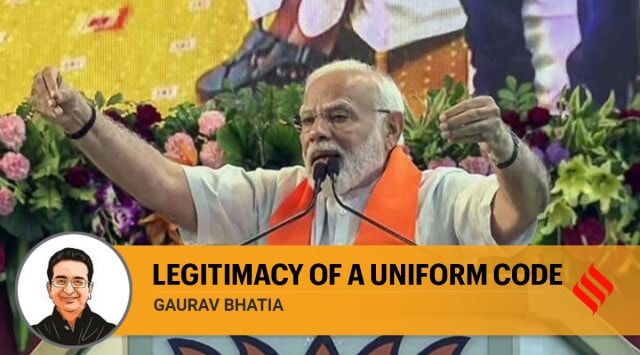
Prime Minister Narendra Modi, while addressing BJP workers during the “mera booth sabse majboot” programme in Bhopal recently, reminded the country of the government’s obligation and duty to implement the Uniform Civil Code (UCC) envisaged in the Constitution. Article 44 of the Constitution reads, “the state shall endeavour to secure for the citizens a uniform civil code throughout the territory of India’. The language of Article 44 reveals the unambiguous intention of the framers of the Constitution and that they felt the UCC was in the national interest.
PM Modi’s speech rekindled the hope that the country would soon have the UCC. On August 5, 2019, the Modi government had abrogated Article 370. India knows well that Modi is the best chance for it to have the UCC, which would help end the discrimination meted out to various sections of society, particularly Muslim women, in the garb of customary laws.
The legitimacy of UCC stems from three crucial sources: the Constitution of India, the Constituent Assembly debates, and Supreme Court judgments. The Constitution serves as the guiding light, embodying the principles of justice, gender equality, and secularism forms the bedrock of the UCC. The Constituent Assembly debates offer valuable insights into the intent behind promoting a common civil code. The Supreme Court judgments have consistently reaffirmed the significance of the Constitution and its fundamental values while interpreting personal laws and addressing conflicts between customary practices and fundamental rights. Drawing its strength from these pillars, the UCC can protect against discrimination in matters pertaining to divorce, maintenance, adoption and succession.
All political parties must look at the Constituent Assembly debates, especially the views of leaders such as B R Ambedkar, K M Munshi, Alladi Krishnaswamy Iyer, among others, for guidance. In the words of K M Munshi: “The point however, is this, whether we are going to consolidate and unify our personal law in such a way that the way of life of the whole country may in course of time be unified and secular… What have these things got to do with religion I really fail to understand.” The opposition parties are guilty of the charge of dereliction of their duty by ignoring the case of UCC.
Political parties opposing the UCC by invoking customs should peruse various judgments of the Supreme Court. In Sarla Mudgal (1995), the Court said: “It appears that even 41 years thereafter, the rulers of the day are not in a mood to retrieve Article 44 from the cold storage where it is lying since 1949. The governments, which have come and gone, have so far failed to make any effort towards unified personal law for all Indians. The reasons are too obvious to be stated.”
It is imperative to recognise that in instances where fundamental rights clash with customary law, the former must take precedence. The UCC seeks to establish a common set of civil laws for all citizens, regardless of their religion and culture, thereby promoting equality and ensuring justice for all. The Supreme Court in the Indian Young Lawyers Association case (2018) said, “… in the constitutional order of priorities, the right to religious freedom is to be exercised in a manner consonant with the vision underlying the provisions of Part III (Fundamental Rights).” Personal laws should be constitutionally compliant and in conformity with the norms of gender equality and the right to live with dignity. The supremacy of fundamental rights over customary law ensures that various freedoms guaranteed to all citizens under the Constitution are safeguarded.
Governments in the past could not muster the courage to implement the UCC because they feared it would incur the wrath of a section of Muslim voters. Opposition parties must realise that they could play a constructive role in the smooth implementation of UCC. Parties like the Congress, Trinamool Congress, Samajwadi Party and AIMIM are indulging in appeasement politics and have not cared to make any suggestions before the Law Commission of India: The Commission issued a public notice dated June 14, 2023, inviting views within a period of 30 days.
Politicians opposing the implementation of UCC should acknowledge a fundamental principle — that India’s governance is rooted in the Constitution, and not in any religious book. The UCC seeks to harmonise personal laws and ensure equal treatment and protection of fundamental rights for all citizens, irrespective of their religious affiliations. The UCC is not an attempt to undermine or marginalise any specific religious community, but a means to create a just and unified legal framework that upholds the principles enshrined in the Constitution.
Under the leadership of Narendra Modi, we have witnessed a transformative shift in societal dynamics, particularly in relation to the empowerment of Muslim women. The abolition of the regressive practice of “triple talaq” is a testimony to this transformation. The priority of the BJP-led government has been to ensure that the fundamental rights guaranteed under the Constitution are available to all citizens irrespective of their religion. There can be no compromise on human dignity in matters pertaining to adoption, succession, marriage, divorce etc.; these issues must be governed by the constitutional scheme, not by religious diktats.
The writer is a senior advocate in the Supreme Court of India and national spokesperson, BJP